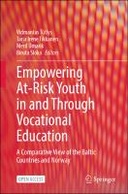Explore

Empowering At-Risk Youth in and Through Vocational Education
0 Ungluers have
Faved this Work
Login to Fave
This open access book presents insights on the resiliency strategies of at-risk vocational education and training (VET) students in the field of learning, employment and social integration, in the Baltic countries and Norway. It investigates the ways in which vocational education and training (VET) can enhance the social inclusion of young people at-risk, both in terms of combating school dropout rates, and promoting transitions between various (social) learning contexts, such as school-work transition. Book presents the findings of the analysis of available statistical data disclosing the capacities and potential of the VET systems and providers to empower vulnerable learners in the project partner countries. In the context of VET, this book examines the situations of at-risk young people as they experience, and understand themselves, in it, and explores innovative solutions to address their challenges in collaboration between themselves, their teachers, and other community actors and stakeholders. Finally, it analyses and discusses the innovative pedagogical interventions used in empowering at-risk VET students as implemented in the research project 'EmpowerVET', on the basis of the Educational Learning Lab model developed by researchers from the University of Tallinn School of Educational Sciences.
This book is included in DOAB.
Why read this book? Have your say.
You must be logged in to comment.
Rights Information
Are you the author or publisher of this work? If so, you can claim it as yours by registering as an Unglue.it rights holder.Downloads
This work has been downloaded 10 times via unglue.it ebook links.
- 10 - pdf (CC BY) at OAPEN Library.
Keywords
- Agency and identity of at-risk VET students
- Educational Learning Labs
- Empowering effects of the work-based learning
- Empowering NEET’s and dropouts from the VET programmes
- Implications of skill formation policies
- Pedagogical and organizational approaches
- Potential of the VET schools in empowering at-risk learners
- Resilience strategies of at-risk VET students
- Roles of VET teachers and trainers
- Socio-ecological frameworks of empowerment of at-risk learners i
- thema EDItEUR::J Society and Social Sciences::JH Sociology and anthropology::JHB Sociology
- thema EDItEUR::J Society and Social Sciences::JN Education
- thema EDItEUR::J Society and Social Sciences::JN Education::JNF Educational strategies and policy
- thema EDItEUR::J Society and Social Sciences::JN Education::JNR Careers guidance::JNRV Industrial or vocational training
Links
DOI: 10.1007/978-981-96-0613-9Editions

